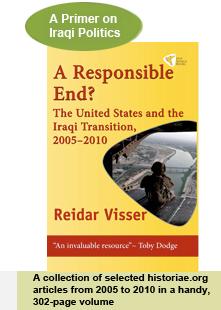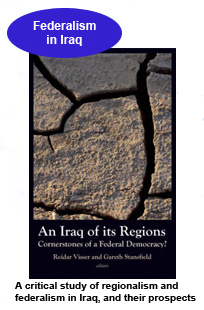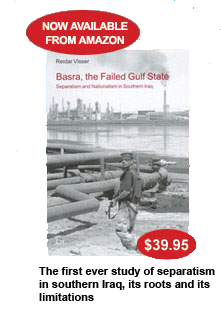



| Main | |
| Documents & images | |
| Links | |
| Contact | |
 | |
| amazon.com |

|
|
|
amazon.com
amazon.co.uk |
|

|
|
|
amazon.com
amazon.co.uk |
|
Obama’s New Iraq Strategy: Clarity on Troop Withdrawals; Uncertainty about Political Reform
By Reidar Visser (www.historiae.org)
27 February 2009
In President Barack Obama’s new strategy for Iraq, presented at Camp Lejeune in North Carolina earlier today, there is marked tension between the diagnosis of today’s situation and the proposed treatment.
The diagnosis is mostly on the spot. In his speech, Obama pointed out that “too many fundamental questions remained unresolved” in the political arena. For now, one can only speak of “hope” attached to “emerging foundations”. Moreover, any solution in Iraq must be “political” and not “military” – a valid point that echoes criticism Democrats frequently presented during the Bush years. Obama mostly steered clear of reducing the Iraqi problem to a one-dimensional sectarian struggle, and he highlighted the Iraqi nation’s ability to withstand the attempts by radical groups to sow disunity in 2006 and 2007.
What, then, does Obama propose to deal with what is clearly still “work in progress” in Iraq as far as the political process is concerned? This is where the problems in his new strategy begin. The strategy has got three parts. One is to withdraw US forces according to the SOFA agreement: All combat forces out by the summer of 2010; a “residual” force of 35,000 to 50,000 troops by the end of 2011. This act of withdrawal appears to be mostly unconditional and without any close relationship to the Iraqi political process, i.e. the only factor that will make changes to the planned timetable of withdrawal seems to be the question of whether Iraqi security forces continue to “remain non-sectarian” (the training will be discontinued if sectarian tendencies are detected). This first element of the strategy in itself is going to be a tough sell before the referendum on the SOFA scheduled for July, with the “residual” force probably a lot bigger than what many Iraqis are able to stomach. It is positive that Obama appears to be sincere about the idea of a full withdrawal by the end of 2011, but he seems to underestimate the possibility that Iraqi leaders, knowing their troubled history of semi-mandates in the past (especially the period 1932–1958) will call for a full withdrawal earlier. In so doing, he may be reproducing the questionable assumption found among some US military officials that Iraqi leaders will always be interested in a prolonged US presence, also beyond 2011, simply in order to stay in power.
But Iraqi critics will also be concerned with the second and third parts of the strategy, dedicated to the Iraqi political and the regional levels respectively. Here, there is less in the way of specifics, and much seems to hinge on the efforts of some of the top diplomats recently nominated to key positions. There will be “sustained diplomacy” with the aim of establishing a “prosperous and peaceful Iraq”, and the United States is going to be an “honest broker”, but where is the leverage in this process going to come from? Has not Nuri al-Maliki already addressed this aspect, saying that the time for Washington to make demands concerning Iraq’s political process has ended? Will elections assistance by the United Nations and capacity-building assistance to the Iraqi government be sufficient to deal with the monumental task of getting the Iraqi constitutional process back on track? The withdrawal will not start in earnest until after the parliamentary elections scheduled for December 2009 (this point was not mentioned in Obama’s speech but has been leaked to the press), but where are the measures that can help turn those elections into the truly transformative moment that Iraq never got during the first try in 2005 – and thereby make the US presence tolerable and perhaps even legitimate in the eyes of most Iraqis until 2010, in a determined but finite political "surge"?
On these issues, we still do not know much more than that they will be handled by Christopher Hill in Baghdad as well as George Mitchell, Dennis Ross and Richard Holbrooke with regard to the broader regional situation. The rest of Obama’s plan for Iraq deals with issues relating to the welfare of the US military forces; in that sense, it is susceptible to the criticism that it is more specific when it comes to healing America than in terms of healing Iraq. As was the case during the Bush administration, the US military remains in the lead (Obama cited his consultations with Robert Gates and the Joint Chiefs of Staff), and the political component of Washington’s Iraq policy remains underdeveloped and unclear. In Obama’s warning about the “risk of seeking perfection in Iraq” there is also potentially a cover for a US withdrawal from a damaged land that has been repaired much too shoddily.
Copyright © 2005-2008 historiae.org & Reidar Visser
This document or quotes from it may be freely reproduced as long as www.historiae.org is credited as the original source.
